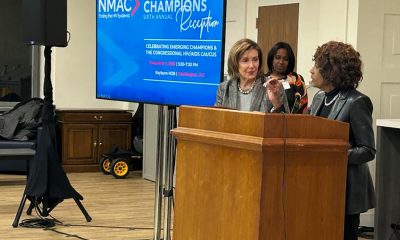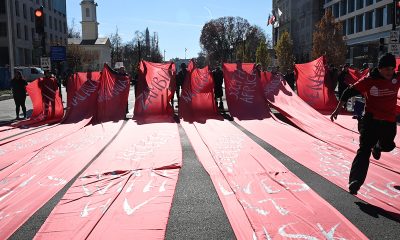News
State Dept. pledges to raise concerns over Nigeria anti-gay law
Says United States does ‘regret’ passage of restrictive legislation
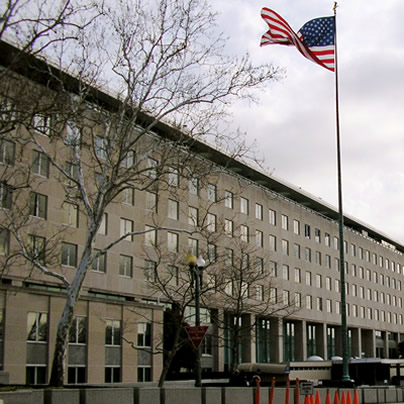
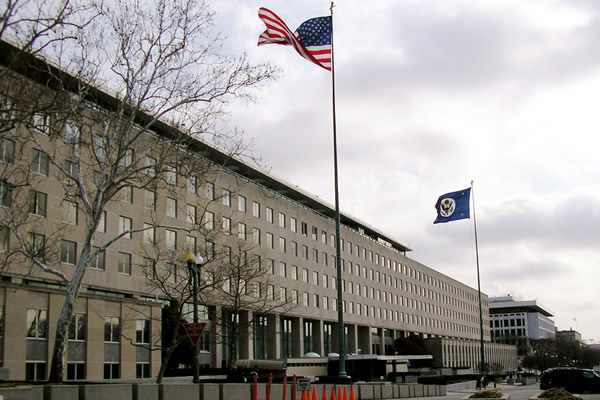
The State Department says the United States does ‘regret’ passage of the anti-gay law in Nigeria. (Photo public domain)
State Department Deputy Spokesperson Marie Harf said on Monday the United States “will keep raising” concerns about Nigeria’s new anti-gay law, but maintained the relationship between the two countries will continue.
Under questioning from the Washington Blade, Harf said the State Department does “regret” the signing of the legislation by Nigerian President Goodluck Jonathan as she emphasized the country has a right to pass legislation through the democratic process.
“We just don’t support any legislation that institutionalizes discrimination against one select group of people, and I think one of the key reasons we are opposed to this is that the law goes far beyond prohibiting same-sex marriage,” Harf said. “It restricts freedom of assembly, association and expression for all Nigerians.”
As Secretary of State John Kerry noted in a statement earlier in the day, Harf said the law is “inconsistent” with the country’s international legal obligations and rights under its constitution.
“Obviously, we’ll keep raising these issues when they come up,” Harf said. “We’ve made our position on this very clear. It may make some work in the country harder to do, but we clearly have a relationship there that’s an important one, and we’ll continue working together.”
The law bans not only same-sex marriage and same-sex “amorous relationships,” but also membership in LGBT rights groups.
The Associated Press reports it’s now a crime in the country “to have a meeting of gays, or to operate or go to a gay club, society or organization.” Further, entering into a same-sex marriage contract or civil union is punishable by up to 14 years’ imprisonment.
During the briefing, Harf conceded that she didn’t immediately have a lot of information about the law, such as which international obligations it violates and whether the State Department had any prior knowledge Jonathan would sign the measure. Although she said she hasn’t heard any talk about possible sanctions against the country or a potential loss of aid as a result of the law, Harf said she’d have to double check.
But Harf was able to confirm that State Department officials were in contact with a variety of principals in Nigeria prior to the signing of the legislation.
“Since the law was in draft form, we’ve been in continual contact with the Jonathan administration, the National Assembly and a wide variety of Nigerian stakeholders,” Harf said. “Our conversations have been focused on our concerns that portions of the law, again, appear to restrict Nigerians’ rights to freedom of expression, assembly and association — provisions that we’ve been very clear we do not support.”
Harf wasn’t able to immediately identify who was representing the United States in those talks, including whether it was a senior diplomat or someone in a lower position.
According to the Associated Press, Nigeria is one of the top crude oil suppliers to the United States. A report from the U.S. Energy Information Administration indicates the U.S. oil imports from Nigeria are decreasing, but the United States imported 161,558 barrels of oil from the country in 2012.
News that the anti-gay legislation was signed in Nigeria is breaking after earlier reports a man in Cameroon died after being previously jailed for texting a same-sex partner and the Uganda parliament approved its own anti-gay legislation.
Harf said she wasn’t immediately able to say whether the State Department is concerned about an anti-gay trend in Africa, but maintained the Obama administration supports LGBT rights everywhere.
“We’ve talked about it elsewhere — whether it’s Russia, here or elsewhere — that we believe that LGBT rights are human rights, there’s no place for discrimination anywhere, such as this,” Harf said.
A partial transcript of the exchange between the Blade and State Department follows:
Washington Blade: Secretary Kerry issued a statement earlier today saying he’s “deeply concerned” about the passage of the anti-gay law in Nigeria, which contains punishments of up to 14 years in prison. Will passage of that law impact U.S.-Nigeria relations?
Marie Harf: Well, we did release a statement, and I would just note that we do regret that this bill, passed by Nigeria’s national assembly. was signed into law on Jan. 7.
Obviously, we respect the sovereignty of the Federal Republic of Nigeria and the prerogatives of its national assembly to pass legislation. We just don’t support any legislation that institutionalizes discrimination against one select group of people, and I think one of the key reasons we are opposed to this is that the law goes far beyond prohibiting same-sex marriage.
It restricts freedom of assembly, association and expression for all Nigerians. It’s inconsistent with Nigeria’s international legal obligations and undermines the democratic reforms and human rights protections enshrined in Nigeria’s constitution.
Obviously, we’ll keep raising these issues when they come up. We’ve made our position on this very clear. It may make some work in the country harder to do, but we clearly have a relationship there that’s an important one, and we’ll continue working together.
Blade: You just said it’s inconsistent with Nigeria’s international legal obligations. To which obligations are you referring?
Harf: I can check specifically with our attorneys and see what they intended with this part of the statement. Obviously, freedom of assembly, association and expression are topics we talk about a lot in terms of legal obligations, and also, anti-discrimination obligations as well. I can check if there’s more legal specifics to share.
Blade: Were there any conversations between State Department officials and Nigeria prior to the signing of this legislation?
Harf: There were. Let me what I have here. Since the law was in draft form, we’ve been in continual contact with the Jonathan administration, the National Assembly and a wide variety of Nigerian stakeholders. Our conversations have been focused on our concerns that portions of the law, again, appear to restrict Nigerians’ rights to freedom of expression, assembly and association — provisions that we’ve been very clear we do not support.
Blade: And who was representing the United States in those talks?
Harf: I can double-check and see who the specifics there are. I don’t have that in front of me.
Blade: The statement that the secretary put out was embargoed until an announcement from the Nigerian government. Did the State Department know this law was going to be signed beforehand?
Harf: I can check on that. Obviously, we’ve been discussions since it was in draft form and it passed. We were in discussions with the administration. I’m happy to check on that. Obviously, we allow governments to speak for themselves before we speak publicly about things as well.
Blade: Could sanctions or a loss of aid be on the table as a result of this law?
Harf: I haven’t heard talk of any of that. I’m happy to check with our folks. Again, we’ve made very clear what our position is on this, and I just don’t have a ton more on it. So, I know you probably have ten follow ups, but I’m happy to take them and see if I can answer them, but then we’ll move on.
Blade: Let me ask you one last question then. The news is breaking just after a man in Cameroon died after being sentenced for being gay and after Uganda passed its own anti-gay legislation — the parliament there. Is the State Department concerned about a larger trend in Africa about passage of anti-gay legislation?
Harf: I’m happy to check with our folks and see if there’s a trend that they’re concerned about. We speak very clearly for LGBT rights across the globe. We’ve talked about it elsewhere — whether it’s Russia, here or elsewhere — that we believe that LGBT rights are human rights, there’s no place for discrimination anywhere, such as this. So, we’re very clear whether it’s Africa or somewhere else that this is something we feel very, very strongly about. President Obama and the secretary have all made very clear statements to that regard. And I’m happy to check if there’s more details on this if you have more follow-ups.
The White House
SPJ calls for take down of Trump’s ‘media offenders’ website
White House launched online database on Monday

The Society for Professional Journalists has called out the White House for creating a website that targets individual journalists and news outlets that publish unfavorable coverage of the Trump-Vance administration.
In a letter to White House Press Secretary Karoline Leavitt on Monday, the SPJ — the nation’s most broad-based journalism organization, which works to protect the free practice of journalism with high ethical standards — asked the White House to take down its website singling out journalists for negative coverage of the administration.
“Journalists have a constitutionally protected and societally encouraged duty to hold power to account. They are not political opponents to be tracked, cataloged or punished,” the letter signed by SPJ National President Chris Vaccaro and SPJ Ethics Committee Chair Dan Axelrod.
“By publishing reporters’ names, outlets and specific stories, the White House is naming and shaming members of the press in a highly charged political and social environment. SPJ regards this as a form of online harassment that exposes journalists to potential threats and even violence.”
The website currently lists 23 outlets as “Media Offenders of the Week,” singling out national organizations like CBS News, the Boston Globe, and the Independent. The website says these particular organizations “misrepresents and exaggerates President Trump.”
The letter goes on to explain that there are more civil ways to disagree with published stories without singling out people for doing the only constitutionally protected job in the country.
“There are well-established ways of resolving disagreements over the fairness or accuracy of stories. The White House web page attacking so-called ‘media offenders’ ignores these principles and instead denigrates and attacks reporters.”
It also highlights how Trump often attacks women journalists in particular, noting that two weeks ago he told White House correspondent Catherine Lucey from Bloomberg News to be “quiet piggy” after she asked questions related to Trump’s relationship with sex offender Jeffery Epstein on Air Force One.
“Journalists, particularly women, already face an enormous amount of online harassment, and this can convert into physical violence. As you know, women journalists have also been publicly insulted by the president in recent weeks.”
The letter also explains that attacks like this on the legitimate press can cause tensions between journalists who attempt to hold those in power responsible and the public who consumes the rhetoric.
“This page, which categorizes reporting as ‘lies,’ ‘left-wing lunacy,’ and ‘malpractice,’ has a chilling effect on coverage. It undermines the healthy democratic relationship in which journalists hold power to account.”
The letter also draws a connection to how the Russian authoritarian dictatorship references media it dislikes, saying, “The president’s new ‘media offenders’ list mirrors a 2017 initiative by the Kremlin that labeled independent journalism as ‘fake news.’ The United States should not follow that example.”
“SPJ believes civility must be restored between the media and the Administration. Removing this page would be a vital first step toward lowering the temperature and reinforcing America’s commitment to free expression.”
The SPJ’s code of ethics, widely regarded as the ethical standard for good journalism, has four main pillars: Seek Truth and Report It, Minimize Harm, Act Independently, and Be Accountable and Transparent. The code was adopted in 1926 from the American Society of Newspaper Editors and has been revised multiple times since then, including in 1984, 1987, 1996, and most recently in 2014.
NLGJA, the The Association of LGBTQ+ Journalists is the journalist-led association that works within the news media to advance fair and accurate coverage of LGBTQ+ communities and issues, provided a statement to the Blade on the website and supports the SPJ’s public call for removing the website to restore faith in journalistic freedom in the U.S.
“We stand with SPJ in urging the Trump administration to remove its website targeting so-called “media offenders.” While NLGJA believes that media organizations should be held to the highest standards of accuracy and ethical reporting, this website does nothing to support a healthy press environment,” National Board President Ken Miguel told the Blade via email. “Instead, it undermines public trust in the free press, enables the harassment and targeting of journalists, and hinders their ability to cover the news fairly and accurately. Journalists must be able to do their work without fear of government retaliation.”
The White House has not responded to the Washington Blade’s request for comment on the letter.
Maryland
FreeState Justice launches 501(c)(4) group
FreeState Equality will focus on policy and advocacy
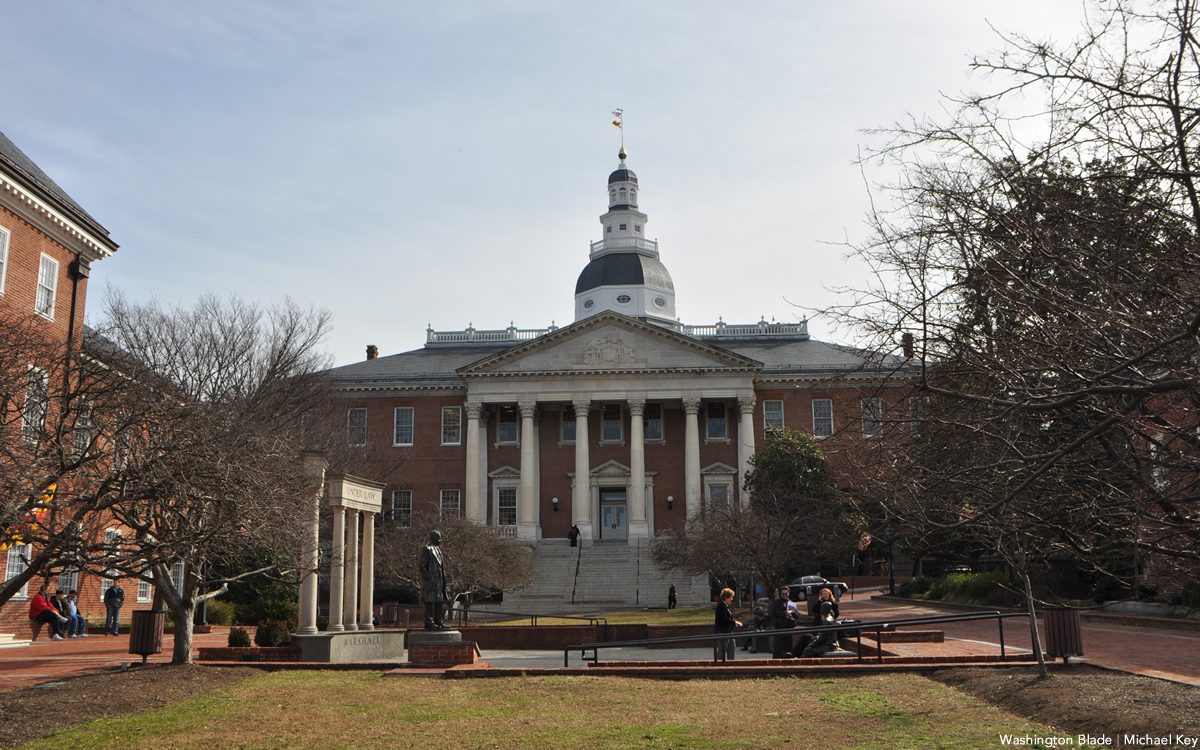
FreeState Justice, an LGBTQ organization that provides legal services, community programs, and public education in Maryland, announced the launch of FreeState Equality on Wednesday.
The new, independent organization intends to pursue advocacy and policy work beyond the legal capability of FreeState Justice, a 501(c)(3) non-profit. FreeState Equality functions as a 501(c)(4) organization, meaning it can partake in political activity.
“We are committed to transparency throughout this process and look forward to continuing our work together in service of LGBTQ+ Marylanders,” said FreeState Justice Executive Director Phillip Westry.
FreeState Equality will take on policy, advocacy, and civic engagement initiatives while FreeState Justice will pursue legal and direct-service work, according to Westry.
While both organizations adhere to similar values, they will feature separate leadership, operations and compliance.
FreeState Equality is hosting its first launch fundraiser on Dec. 10 at the Brass Tap in Baltimore. The event, held from 5-7 p.m., will feature insight from FreeState Equality staff about how Maryland policy can support the state’s LGBTQ community.
Attendees can purchase fundraiser tickets on Zeffy for $25 general admission, which includes a free first drink. The organization also welcomes additional donations.

By LEE O. SANDERLIN, PAMELA WOOD and BRENDA WINTRODE | Maryland House of Delegates Speaker Adrienne A. Jones, the first woman and first person of color to hold her position, stepped down from her leadership post Thursday, effective immediately.
Jones, 71, has been a member of the legislature since 1997 and ascended to the top role in 2019 following the death of longtime House Speaker Michael E. Busch.
Jones held a meeting with top House Democratic leaders Thursday afternoon, sources said, at which she informed them of her decision. In a statement, Jones described the changes of life’s seasons and said she was ready to focus on what lies ahead.
The rest of this article can be found on the Baltimore Banner’s website.
-

 The White House2 days ago
The White House2 days ago‘Lavender Scare 2.0’: inside the White House’s campaign against LGBTQ federal employees
-

 District of Columbia4 days ago
District of Columbia4 days agoHIV/AIDS activists block intersection near White House
-

 a&e features1 day ago
a&e features1 day agoMeet Mr. Christmas
-

 Japan3 days ago
Japan3 days agoTokyo court upholds Japan’s same-sex marriage ban



